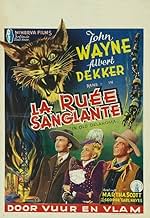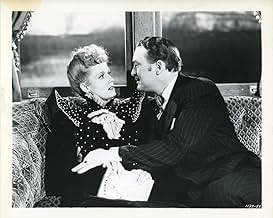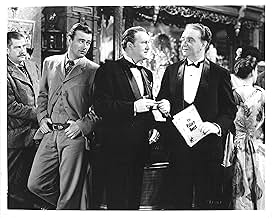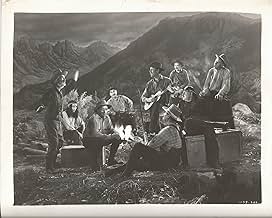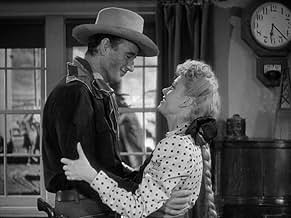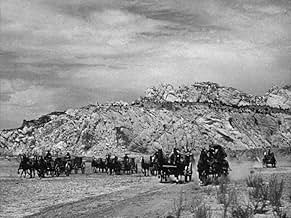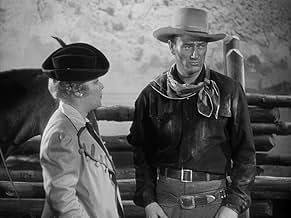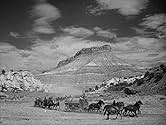IMDb RATING
6.4/10
1.7K
YOUR RATING
In 1906, on Oklahoma's Indian lands, a cowboy fights for oil lease rights against a greedy oilman while a pretty schoolteacher steals both men's hearts.In 1906, on Oklahoma's Indian lands, a cowboy fights for oil lease rights against a greedy oilman while a pretty schoolteacher steals both men's hearts.In 1906, on Oklahoma's Indian lands, a cowboy fights for oil lease rights against a greedy oilman while a pretty schoolteacher steals both men's hearts.
- Director
- Writers
- Stars
- Nominated for 2 Oscars
- 2 nominations total
Foncilla Adams
- Girl
- (uncredited)
Stanley Andrews
- Mason - Indian Agent
- (uncredited)
Charles Arnt
- Joe - Train Conductor
- (uncredited)
- Director
- Writers
- All cast & crew
- Production, box office & more at IMDbPro
6.41.7K
1
2
3
4
5
6
7
8
9
10
Featured reviews
better than your average western
In imdb, it's In old oklahoma.... roku has this as war of the wildcats 1943; the opening credits show wildcats. Stars john wayne, al dekker. When school teacher catherine allen heads west to really experience life, she bumps smack into wildcat oilman jim gardner and cowboy dan somers. Of course, they both chase after her. As well as oil rights. And what kind of a western would this be without gabby hayes? And dale evans in one of her earlier roles. It's silly and fun and moves right along. Better than your average western. Not dry and dusty like so many others. Directed by albert rogell. Nominated for best music and best sound.
Perhaps this is a B+ or A- film!
This film is also very commonly known as "War of the Wildcats". As you watch it, the movie sure looks like a B--but with just a bit more polish, a bit longer running time and a bit more in the way of budget. This is because the film is sort of like a transitional film for Wayne. While he played in a ton of Bs during the 1930s, around 1939 (with "Stagecoach") he began playing in better and better films. But many of them looked a lot like Bs and felt a lot like Bs. His bigger budget studio projects were still a few years ahead.
The film begins with a feminist author (Martha Scott) leaving her tiny town. Apparently the local prudes were angry at her writing such a scandalous romance novel--and you get the impression that it really isn't THAT bad. In fact, it really can't be because Scott is a school teacher and never really lived a worldly life in this town. So, at the urging of the women, she is determined to see the world--and be more like one of her characters. But, she is conflicted and isn't quite sure where to go or what to do. Her dull old aunt wants her to live with her in Kansas City--but when she meets a big-time oil man (Albert Dekker), he convinces her to follow him to the oil fields and promises her wealth and excitement. There are two problems with this. First, Dekker is a bit of a pig and an ego-maniac. Second, John Wayne pops into her life--and back then he was a major hunk. And, since he was the star, it's not especially surprising where it all ends. In the middle portion of the film, Wayne and Dekker vie for power and fight over oil land that the Indians are willing to lease. But Dekker is determined not to play nicely--and seems willing to use some dirty tricks to make sure he alone gets these leases.
Overall, this is not an especially deep film nor is it very realistic. However, it is fun--and that is very important. Gabby Hayes and especially Marjorie Rambeau provide some fun support and color.
The film begins with a feminist author (Martha Scott) leaving her tiny town. Apparently the local prudes were angry at her writing such a scandalous romance novel--and you get the impression that it really isn't THAT bad. In fact, it really can't be because Scott is a school teacher and never really lived a worldly life in this town. So, at the urging of the women, she is determined to see the world--and be more like one of her characters. But, she is conflicted and isn't quite sure where to go or what to do. Her dull old aunt wants her to live with her in Kansas City--but when she meets a big-time oil man (Albert Dekker), he convinces her to follow him to the oil fields and promises her wealth and excitement. There are two problems with this. First, Dekker is a bit of a pig and an ego-maniac. Second, John Wayne pops into her life--and back then he was a major hunk. And, since he was the star, it's not especially surprising where it all ends. In the middle portion of the film, Wayne and Dekker vie for power and fight over oil land that the Indians are willing to lease. But Dekker is determined not to play nicely--and seems willing to use some dirty tricks to make sure he alone gets these leases.
Overall, this is not an especially deep film nor is it very realistic. However, it is fun--and that is very important. Gabby Hayes and especially Marjorie Rambeau provide some fun support and color.
Move Over Texaco, The Duke Is Coming
Plot-- Business tycoon Gardner wants drilling rights on Indian land and he'll use about every trick to get it. But he's up against the local little guys who've pooled their assets to get the same rights. Luckily they see in cowboy drifter Dan Somers a guy with the potential to lead them even if he doesn't see that potential himself. Plus, Dan and Gardner become rivals over the affections of winsome writer Catherine.
That climatic wagon stampede across the flat prairie still has me dizzy. Great action effect that must have employed every stuntman in Hollywood, to say nothing about every wagon. Now, if Dan (Wayne) doesn't get to the government office first, then the scheming Gardner (Dekker) gets the oil millions. Okay, so Dan's got an edge since the government man likes the ladies more than his duties. But, what great rivals Wayne and Dekker make. Each is an imposing presence, even if Wayne puts on his best "aw shucks" act, while Dekker keeps an icy calm. And I love it when they duel gimlet-eye to gimlet-eye. Still, sweet-face Martha Scott gets as much screen time as the guys, so likely Republic was trying to build her into a star. And, of course, where there's Wayne, Gabby Hayes can't be far behind, doing his unforgettable crusty old coot bit. And catch the pre-Roy Dale Evans bringing down the house with as charming a stage number as many an A-musical. No wonder Roy grabbed her.
All in all, it's a spectacular action flick, even if the romantic interludes get a little tiresome. Wayne sure shows his acting chops, more animated than I've seen him. His cowboy Dan goes from just another prairie drifter to hard-driving trail boss in really convincing fashion. And though he'd probably hate the word, he does it in what amounts to winning fashion. And catch that opening sequence in Gardner's private car. It's unusual and superbly done. Republic popped a bundle for this, and it shows up in the colorful crowd scenes (thanks to director Rogell) and big oil well gushers, along with that final stampede.
I'm not sure why this unusual oater is so obscure in the Wayne canon. But in my book it's as good entertainment as any of his many horse operas. And for fans of crashing buckboards, this is the Promised Land.
That climatic wagon stampede across the flat prairie still has me dizzy. Great action effect that must have employed every stuntman in Hollywood, to say nothing about every wagon. Now, if Dan (Wayne) doesn't get to the government office first, then the scheming Gardner (Dekker) gets the oil millions. Okay, so Dan's got an edge since the government man likes the ladies more than his duties. But, what great rivals Wayne and Dekker make. Each is an imposing presence, even if Wayne puts on his best "aw shucks" act, while Dekker keeps an icy calm. And I love it when they duel gimlet-eye to gimlet-eye. Still, sweet-face Martha Scott gets as much screen time as the guys, so likely Republic was trying to build her into a star. And, of course, where there's Wayne, Gabby Hayes can't be far behind, doing his unforgettable crusty old coot bit. And catch the pre-Roy Dale Evans bringing down the house with as charming a stage number as many an A-musical. No wonder Roy grabbed her.
All in all, it's a spectacular action flick, even if the romantic interludes get a little tiresome. Wayne sure shows his acting chops, more animated than I've seen him. His cowboy Dan goes from just another prairie drifter to hard-driving trail boss in really convincing fashion. And though he'd probably hate the word, he does it in what amounts to winning fashion. And catch that opening sequence in Gardner's private car. It's unusual and superbly done. Republic popped a bundle for this, and it shows up in the colorful crowd scenes (thanks to director Rogell) and big oil well gushers, along with that final stampede.
I'm not sure why this unusual oater is so obscure in the Wayne canon. But in my book it's as good entertainment as any of his many horse operas. And for fans of crashing buckboards, this is the Promised Land.
Gem of a John Wayne Film
This a John Wayne film like no other. Take it from a huge fan that's seen most of his movies. Although this not classified as a comedy, the Duke's turns in a sly performance full of great one-liners and facial expressions that had me rolling. Its action adventure in the oil fields and it's very entertaining and fun. Wayne is Cowboy Dan Somers and he competes with oilman Jim Gardner for oil lease rights on Indian land in Oklahoma, as well as for the attentions of schoolteacher turned scandalous book author Cathy Allen. It has a good supporting cast including George "Gabby" Hayes. You will never see the Duke quite like this in any other role. If you're a fan of the Duke, you will love this film. It was originally titled "In Old Oklahoma" and then reissued as "War of the Wildcats".
John Wayne Channels 'Destry'
John Wayne plays a cowboy who allows himself to be underestimated by wildcatter Albert Dekker. His 'aw shucks' manner like Jimmy Stewart in 'Destry Rides Again' masks a tough, intelligent character who rises to the challenge posed by Albert Dekker's Jim Gardner.
Part of what makes the movie interesting is that the villain, Jim Gardner, is not just a standard heavy. Yes, he's a ruthless businessman, single minded in his drive for success. On the other hand, he's competent and he's no coward. Early in the movie he arrives at one of his well sites and is told there's a mechanical problem. None of his workers seem able or willing to fix it. Disregarding his personal safety, he climbs a rope to the top of the well and fixes the problem.
He's also a close physical match for John Wayne's character, with two long fights. Like it or not, Gardner represents the kind of entrepreneur that built this country. You can't help having a grudging respect for him.
Wayne's Dan Somers has a populist outlook. At the sight of an oil well spouting oil, Martha Scott's Cathy Allen, gushes "It smells like a new day, like prosperity"; Somers replies, "To me it just smells".
Somers saves Gardner from getting shot by a disgruntled farmer, then prevents Gardner from beating up the farmer. Somers seems to represent a 'New Deal' philosophy.
Part of what makes the movie interesting is that the villain, Jim Gardner, is not just a standard heavy. Yes, he's a ruthless businessman, single minded in his drive for success. On the other hand, he's competent and he's no coward. Early in the movie he arrives at one of his well sites and is told there's a mechanical problem. None of his workers seem able or willing to fix it. Disregarding his personal safety, he climbs a rope to the top of the well and fixes the problem.
He's also a close physical match for John Wayne's character, with two long fights. Like it or not, Gardner represents the kind of entrepreneur that built this country. You can't help having a grudging respect for him.
Wayne's Dan Somers has a populist outlook. At the sight of an oil well spouting oil, Martha Scott's Cathy Allen, gushes "It smells like a new day, like prosperity"; Somers replies, "To me it just smells".
Somers saves Gardner from getting shot by a disgruntled farmer, then prevents Gardner from beating up the farmer. Somers seems to represent a 'New Deal' philosophy.
Did you know
- TriviaSidney Blackmer made a career out of playing Teddy Roosevelt. He played him eight times in various film projects. 1-"This Is My Affair" (1937) 2-"The Monroe Doctrine" (1939) 3-"Teddy the Rough Rider" (1940) 4-"March On, America!" (1942) 5-"In Old Oklahoma" (1943), 6-"Bill "Buffalo Bill" (1944) 7-"My Girl Tisa" (1948) 8-"Never Kick a Man Upstairs" (TV Movie) (1953).
- Quotes
Bessie Baxter: We've got a long way to go, and a short time to get there.
- ConnectionsEdited into Six Gun Theater: In Old Oklahoma (2021)
- How long is In Old Oklahoma?Powered by Alexa
Details
- Release date
- Country of origin
- Language
- Also known as
- Cuando una mujer se atreve
- Filming locations
- Production company
- See more company credits at IMDbPro
- Runtime
- 1h 42m(102 min)
- Color
- Aspect ratio
- 1.37 : 1
Contribute to this page
Suggest an edit or add missing content

